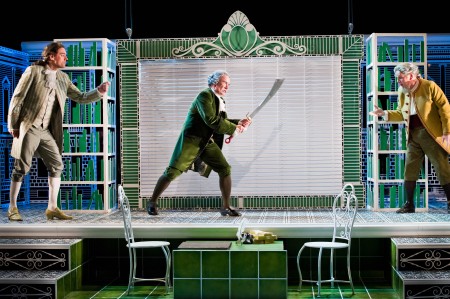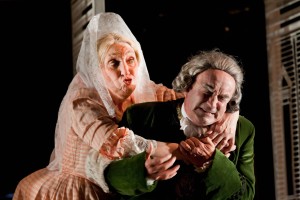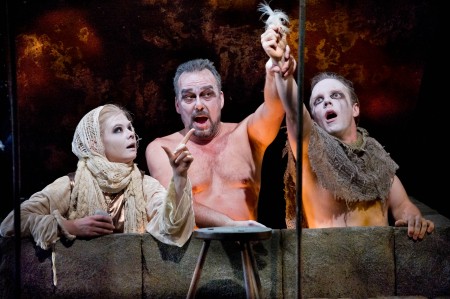What fun this is! When I go to a comic opera I smile sometimes but towards the end of this romp, written by Richard Brinsley Sheridan, I was laughing out loud. Actually it’s more Singspiel than opera, and none the worse for that. The music is delightful, written largely by Thomas Linley and his son Tom Linley, who wrote more of it than anyone else. Young Tom Linley was born the same year as Mozart (1756), but died in an accident when he was 22. He and Mozart met in 1770 and became friends, and as the music historian Charles Burney wrote that year about his travels in Italy, “The ‘Tommasino’, as he is called, and the little Mozart, are talked of all over Italy, as the most promising geniusses of this age.” The music for this charming comedy was written in 1775.
The story is full of misunderstandings and furious assertions of irrevocable decisions, but the essence of the plot is quite simple. The wealthy Don Jerome has a son and a daughter, Ferdinand and Louisa, who are in imminent danger of losing their lovers. One because her father is about to send her to a convent, and the other because Don Jerome rejects Louisa’s choice of the genteel but impoverished Antonio. He wants her to marry the dreadfully silly, but wealthy Isaac Mendosa. The Duenna is Louisa’s guardian in the household, but the two of them change places with hilarious results.
Richard Suart as Don Jerome was absolutely super. Assertive and irascible, he sang and spoke superbly. His diction was brilliant as was that of the whole cast. Nuala Willis as the Duenna was enormous fun, playing her part with relish, and Adrian Thompson as Isaac Mendoza gave an excellent portrayal of a wealthy by smug little twerp who thinks he’s frightfully cunning. Adam Tunnicliffe as the masquerader is on the stage much of the time, and his movements were delightful, helping the drama silently as if he were a single-person Greek chorus.
The designs by Adam Wiltshire are glorious. The stage set-up with screens, and people appearing in frames to read letters they wrote, is really inspired. Marvellous lighting by Guy Hoare, all directed by Michael Barker-Caven, with the ETO Baroque Orchestra directed from the harpsichord by Joseph McHardy. It’s a pleasure to see English Touring Opera in London, and know that they will be taking this delightful production to other cities. It deserves to be a sell-out everywhere.
Two more performances at Covent Garden are scheduled for October 15 and 16 (matinee), after which it will tour to the following venues: Theatre Royal Bath, Oct 18 and 19; Malvern Theatres, Oct 22; De la Warr Pavilion, Bexhill, Oct 27; Exeter Northcott, Oct 30; Cambridge Arts Theatre, Nov 4 and 5; Harrogate Theatre, Nov 8; Snape Maltings Concert Hall, Nov 27.



